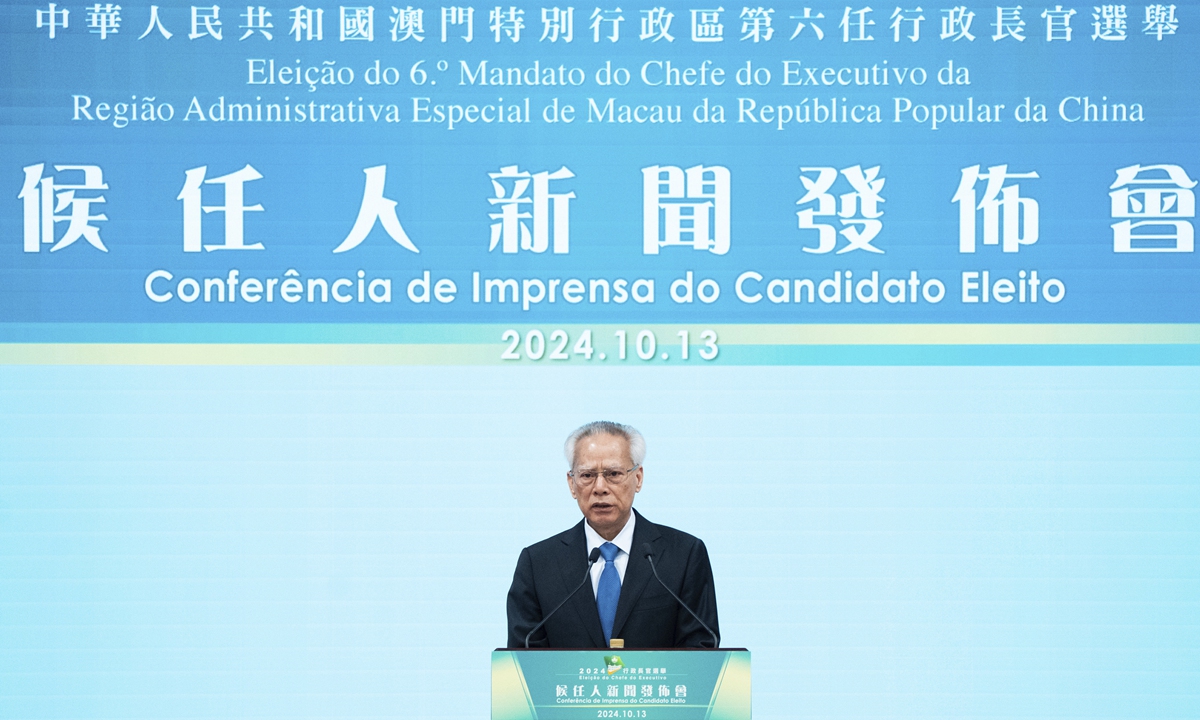Sam Hou Fai elected as Macao SAR's sixth-term chief executive designate
Outcome reflects heartfelt support by city for 'one country, two systems'

Sam Hou Fai is elected by an overwhelming majority as the sixth-term chief executive designate of China's Macao Special Administrative Region (SAR) on October 13, 2024. Photo: VCG.
Sam Hou Fai was elected by an overwhelming majority as the sixth-term chief executive designate of China's Macao Special Administrative Region (SAR) on Sunday.
He won the election with 394 votes in favor out of 398 valid ballots. Song Man Lei, president of the Electoral Affairs Commission for the Chief Executive Election, announced Sam the winner.
The Hong Kong and Macao Affairs Office of the State Council congratulated Sam on his election, stating that this successful outcome fully reflects the heartfelt support of Macao society for the policy of "one country, two systems," as well as the firm confidence in the development path and achievements of the SAR over the past 25 years. It also demonstrates the widespread recognition of Sam, and the earnest expectations of Macao society for new progress and development under the new leadership, said the office in a statement on Sunday.
The election process and outcome further fostered a sense of unity and collective progress within Macao's society and gathered collective efforts for "upholding integrity and innovation," which is crucial in fully implementing the principle of "patriots administering Macao" and continually advancing the successful practice of "one country, two systems" with Macao characteristics, the statement said.
"We believe that the newly elected chief executive of the Macao SAR will unite and lead Macao's society in fostering unity, driving innovation, and creating a brighter future for Macao, making a significant contribution to advancing Chinese modernization, the development of a strong nation and the cause of national rejuvenation," the statement said.
According to Macao's Chief Executive Election Law, an election is valid if two-thirds of the 400-member election committee are present to vote. To be elected, a candidate must receive support from more than half of the committee's members, which is at least 200 votes, the Xinhua News Agency reported.
As prescribed by the Basic Law of the Macao SAR, the chief executive is elected by a broadly representative Chief Executive Election Committee and is then appointed by the Central People's Government. The chief executive serves a five-year term and may be re-elected once. The sixth-term chief executive is expected to take office on December 20.
Born in Zhongshan, South China's Guangdong Province, 62-year-old Sam was enrolled in Peking University Law School in 1981. He also studied Portuguese language and culture, and law at the University of Coimbra in Portugal. He once practiced as a lawyer on the Chinese mainland, according to Macao Radio.
In 1997, he was appointed as a judge to the Court of First Instance in Macao. On the day following Macao's return to the motherland in 1999, he was appointed by Ho Hau Wah, first chief executive of the Macao SAR, as president of the Court of Final Appeal, a position he has held for nearly 25 years. During his tenure, he served as the presiding judge for many major cases, including the corruption case involving Macao's former chief prosecutor Ho Chio Meng, according to Hong Kong Economic Journal.
After Song announced the election result, warm applause was heard in the hall.
In his speech upon election, Sam expressed his gratitude to the committee members.
He highlighted his commitment to faithfully fulfilling his political platform and manifesto, with the primary goal of meeting people's expectations for a better life. His highest principles will be fully, accurately, and steadfastly implementing the "one country, two systems" policy and safeguarding national sovereignty, security, and development interests, he said.
The smooth election reflects the consensus built during the process, bringing people's hearts together, Li Xiaobing, a Hong Kong, Macao and Taiwan affairs expert from Nankai University, told the Global Times on Sunday.
Sam's educational background at Peking University in the mainland and his following public service experience in Macao contributed to his deft handling of many cases as he served as president of the Court of Final Appeal in Macao. His past experiences showed that he is a person of foresight, with a deep understanding of the Basic Law of the Macao SAR and the essence of the "one country, two systems" principle.
According to Li, "patriots administering Macao" has become a social consensus and the mainstream value in the Macao SAR, as well as a successful practice of the "one country, two systems" principle. Sam's election with such a high number of votes is, in fact, a reflection of the implementation of this principle, Li said.
